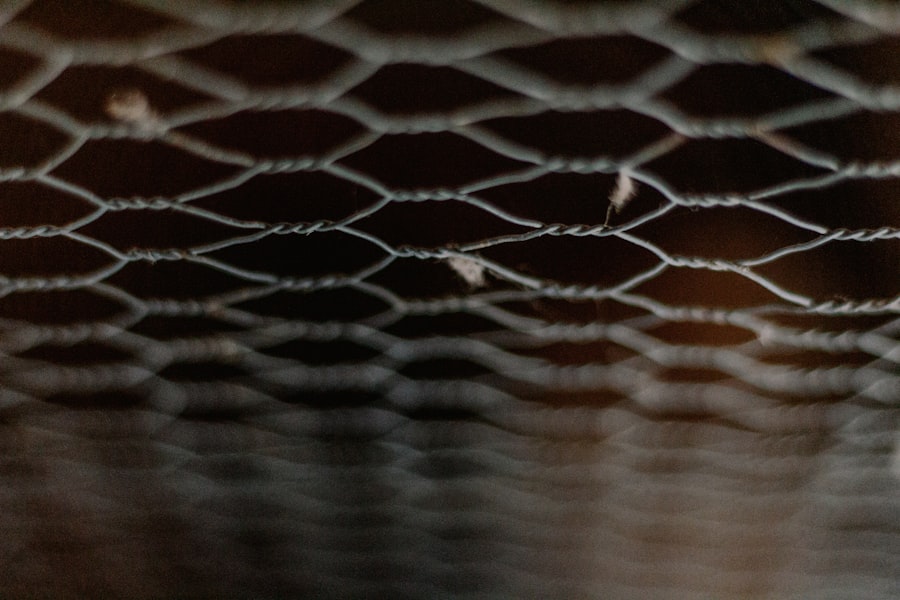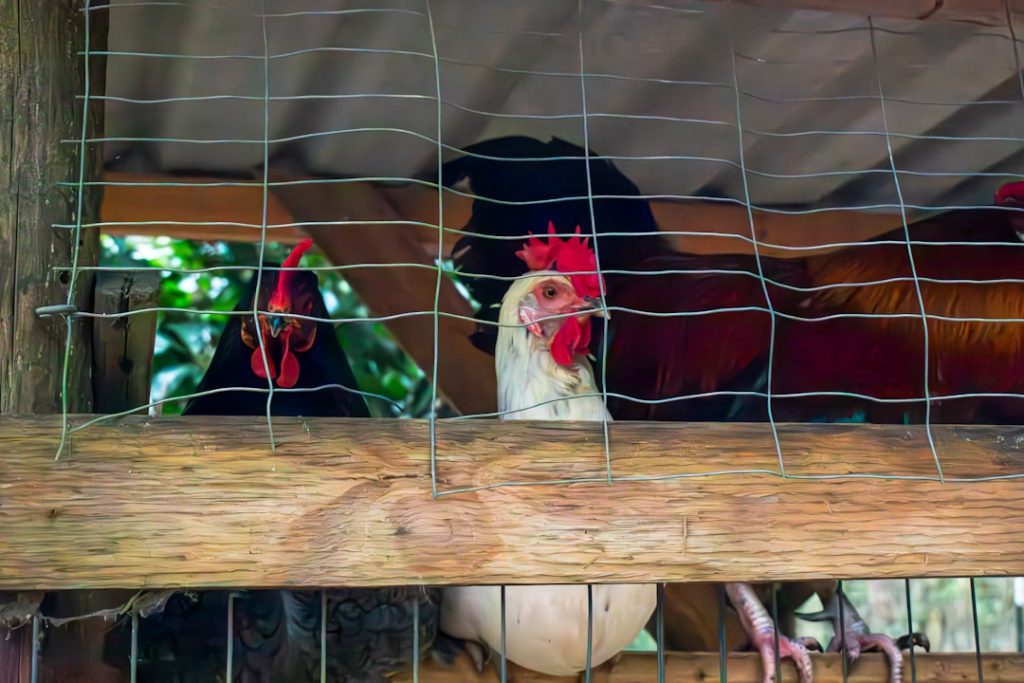Chickens are naturally curious and social animals with a strong foraging instinct. This behavior can lead them to explore areas of a property that may be off-limits, such as gardens or flower beds. Understanding their natural behavior is crucial for effective deterrence.
Chickens are creatures of habit, often returning to established food sources or comfortable resting spots. Addressing chicken intrusion promptly is important to prevent the establishment of routines in restricted areas. Chickens are easily startled by sudden movements or loud noises, which is a relevant factor when implementing deterrent strategies.
They also possess a keen sense of smell and are attracted to certain scents, particularly those of ripe fruits and vegetables. Knowledge of these behaviors can aid in developing effective strategies for keeping chickens out of unwanted areas on a property.
Table of Contents
- 1 Creating Physical Barriers
- 2 Using Natural Deterrents
- 3 Providing Alternative Spaces
- 4 Training and Conditioning
- 5 Regular Maintenance and Cleaning
- 6 Seeking Professional Help
- 7 FAQs
- 7.1 What are some effective ways to keep chickens off your patio?
- 7.2 Why is it important to keep chickens off your patio?
- 7.3 Are there any natural methods to keep chickens off your patio?
- 7.4 Can training chickens to stay off the patio be effective?
- 7.5 What are some potential risks of having chickens on your patio?
Key Takeaways
- Chickens are naturally curious and will explore their surroundings, so understanding their behavior is key to preventing them from entering unwanted areas.
- Physical barriers such as fences and netting can effectively keep chickens out of certain areas, but they must be properly installed and maintained to be effective.
- Natural deterrents like citrus peels, coffee grounds, and vinegar can be used to repel chickens from specific areas without harming them.
- Providing alternative spaces for chickens to explore and forage can redirect their attention away from unwanted areas.
- Training and conditioning chickens to respond to certain cues or avoid certain areas can be an effective long-term solution to keeping them out of unwanted spaces.
- Regular maintenance and cleaning of the chicken coop and surrounding areas can help prevent chickens from wandering into unwanted spaces.
- If all else fails, seeking professional help from a veterinarian or animal behaviorist may be necessary to address persistent chicken behavior issues.
Creating Physical Barriers
Keeping chickens out of certain areas can be achieved by creating physical barriers. These barriers can be made using various materials such as chicken wire, fencing, or netting.
Designing Effective Barriers
These barriers should be tall enough to prevent the chickens from flying or jumping over them, and they should be securely anchored to the ground to prevent the chickens from digging underneath them.
Regular Maintenance is Key
It’s also important to regularly inspect these barriers for any signs of wear or damage, as chickens are persistent creatures and may attempt to find weak spots in the barrier.
Additional Physical Barriers
Another physical barrier that can be effective in deterring chickens is the use of raised garden beds. By elevating your plants and vegetables off the ground, you can make it more difficult for chickens to access them. Additionally, using cloches or row covers can provide an extra layer of protection for your plants. These physical barriers can be an effective long-term solution for keeping chickens out of your garden and other off-limits areas.
Using Natural Deterrents

In addition to physical barriers, there are also natural deterrents that can be used to keep chickens away from certain areas. One effective natural deterrent is the use of predator decoys, such as fake owls or snakes. Chickens are naturally wary of predators, so the presence of these decoys can help deter them from entering certain areas.
It’s important to regularly move these decoys around to prevent the chickens from becoming accustomed to their presence. Another natural deterrent is the use of certain scents that chickens find unpleasant. For example, the scent of citrus fruits or vinegar can be effective in deterring chickens from entering certain areas.
These scents can be applied directly to the ground or plants, or they can be used in the form of sprays or repellents. It’s important to reapply these scents regularly, especially after rain or watering, to ensure their effectiveness.
Providing Alternative Spaces
One way to deter chickens from entering certain areas is by providing them with alternative spaces where they can forage and roost. By creating a designated area for the chickens to feed and rest, you can help redirect their natural behaviors away from your garden or other off-limits areas. This can be done by setting up a separate feeding station with a variety of grains and seeds, as well as providing comfortable roosting spots for the chickens to use.
Additionally, providing the chickens with access to a dust bath can help deter them from entering certain areas. Chickens naturally enjoy dust bathing as a way to keep themselves clean and free of parasites, so by providing them with a designated dust bath area, you can help keep them away from your garden or other off-limits areas. It’s important to regularly maintain these alternative spaces to ensure that the chickens are encouraged to use them instead of venturing into unwanted areas.
Training and Conditioning
Another effective way to deter chickens from entering certain areas is through training and conditioning. Chickens are intelligent animals and can be trained to respond to certain cues and commands. By using positive reinforcement techniques, such as offering treats or praise, you can train the chickens to avoid certain areas on your property.
For example, you can use a specific sound or gesture to signal to the chickens that they should not enter a certain area, and then reward them when they comply. It’s important to be consistent with your training efforts and to regularly reinforce the desired behavior. This may require some patience and persistence, but over time, the chickens can learn to associate certain areas with negative consequences and will be less likely to enter them.
Additionally, conditioning the chickens to associate certain scents with unpleasant experiences can also be an effective way to deter them from entering certain areas.
Regular Maintenance and Cleaning

Remove Attractants
By keeping your property free of fallen fruits and vegetables, as well as cleaning up any spilled grains or seeds, you can help reduce the attractiveness of these areas to the chickens.
Eliminate Hiding Spots
Additionally, regularly removing any debris or clutter from your property can help eliminate potential hiding spots for the chickens.
Maintain Barriers and Deterrents
It’s also important to regularly inspect and maintain any physical barriers or natural deterrents that you have in place. This may include repairing any damaged fencing or netting, reapplying scents or repellents, and moving predator decoys to new locations. By staying on top of regular maintenance and cleaning tasks, you can help ensure that your deterrent strategies remain effective in keeping chickens out of unwanted areas.
Seeking Professional Help
If you have tried various deterrent strategies and are still struggling to keep chickens out of certain areas on your property, it may be time to seek professional help. There are professionals who specialize in wildlife management and can provide expert advice and assistance in deterring chickens and other animals from unwanted areas. These professionals can assess your property and develop customized strategies for keeping chickens at bay.
Additionally, local agricultural extension offices or poultry associations may offer resources and support for dealing with chicken intrusion issues. These organizations may be able to provide valuable information on effective deterrent strategies and connect you with other property owners who have successfully dealt with similar challenges. Seeking professional help can provide you with the expertise and support you need to effectively address chicken intrusion on your property.
In conclusion, deterring chickens from entering certain areas on your property requires an understanding of their behavior and the implementation of effective strategies. By creating physical barriers, using natural deterrents, providing alternative spaces, training and conditioning the chickens, regular maintenance and cleaning, and seeking professional help when needed, you can effectively keep chickens out of unwanted areas. With patience and persistence, you can create a harmonious coexistence with these curious creatures while protecting your property from their intrusion.
If you’re looking for more tips on keeping chickens, you might want to check out this article on Producers Pride Sentinel Chicken Coop. It offers valuable information on how to set up a safe and secure coop for your chickens, which can help keep them off your patio.
FAQs
What are some effective ways to keep chickens off your patio?
Some effective ways to keep chickens off your patio include installing physical barriers such as fences or chicken wire, using repellents such as citrus peels or vinegar, and training the chickens to stay away using deterrents like motion-activated sprinklers.
Why is it important to keep chickens off your patio?
It is important to keep chickens off your patio to prevent damage to the patio surface, furniture, and plants, as well as to maintain a clean and comfortable outdoor space for yourself and your guests.
Are there any natural methods to keep chickens off your patio?
Yes, there are natural methods to keep chickens off your patio, such as using citrus peels, vinegar, or other strong-smelling substances that chickens find unpleasant. Additionally, planting certain herbs or flowers that chickens dislike can help deter them from entering the patio area.
Can training chickens to stay off the patio be effective?
Yes, training chickens to stay off the patio can be effective with consistent and persistent effort. Using deterrents such as loud noises, water sprays, or motion-activated devices can help reinforce the message that the patio is off-limits to the chickens.
What are some potential risks of having chickens on your patio?
Having chickens on your patio can pose risks such as damage to the patio surface, furniture, and plants, as well as potential hygiene and cleanliness issues. Additionally, chickens may leave droppings or feathers on the patio, which can be unsightly and unsanitary.

Meet Walter, the feathered-friend fanatic of Florida! Nestled in the sunshine state, Walter struts through life with his feathered companions, clucking his way to happiness. With a coop that’s fancier than a five-star hotel, he’s the Don Juan of the chicken world. When he’s not teaching his hens to do the cha-cha, you’ll find him in a heated debate with his prized rooster, Sir Clucks-a-Lot. Walter’s poultry passion is no yolk; he’s the sunny-side-up guy you never knew you needed in your flock of friends!


Meet Walter, the feathered-friend fanatic of Florida! Nestled in the sunshine state, Walter struts through life with his feathered companions, clucking his way to happiness. With a coop that’s fancier than a five-star hotel, he’s the Don Juan of the chicken world. When he’s not teaching his hens to do the cha-cha, you’ll find him in a heated debate with his prized rooster, Sir Clucks-a-Lot. Walter’s poultry passion is no yolk; he’s the sunny-side-up guy you never knew you needed in your flock of friends!







